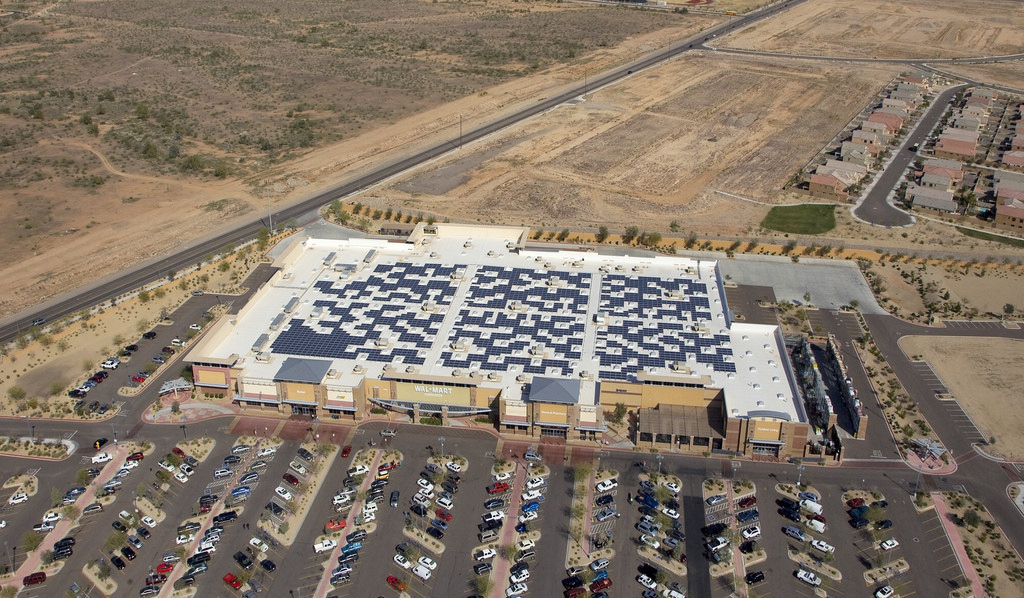On November 8, an already endangered rooftop solar industry took a big hit in Arizona. Three Republican candidates for the Arizona Corporation Commission (ACC) — backed by millions of dollars from the state’s biggest public utility — won their races, increasing the likelihood that new anti-solar policies will soon follow.
In the coming months, the commission, which regulates public utilities and has been marred by conflicts of interest for years, will address requests from the major utility Arizona Public Service (APS) to raise its electricity rates, end net metering, and impose hefty fees on solar users.
If the commission sides with APS on these issues, the rooftop solar industry in the state with the nation’s fourth highest solar energy capacity will likely crumble.
“APS is trying to … make sure it kills solar,” Lucy Mason, executive director of the Arizona Solar Energy Industries Association, told DeSmog.
Shady Election Spending
In 2014, the two Democrats on the five-member Arizona Corporation Commission were ousted by Republicans, who were supported by millions of dollars in spending by outside groups. Rumors spread that either APS, the state’s biggest public utility, or its parent company financed the political spending groups, which were not required to reveal their funders. APS did not deny the charge.
In the recent 2016 elections, after two years of scrutiny and an FBI investigation into the secret money in the ACC elections, APS decided to become more transparent. It formed an independent expenditure committee, the Arizona Coalition for Reliable Electricity, that is required to disclose its donors.
According to campaign finance reports, that committee took in more than $2 million from Pinnacle West, its only donor and the parent company of APS. The committee has reported spending more than $4.1 million towards TV ads and other expenditures backing Republican ACC candidates Bob Burns, Boyd Dunn, and Andy Tobin in the final weeks of the general election.
Solar Candidates
On the other side was a group called Save Our AZ Solar, backed mostly by the major solar company SolarCity, which donated at least $3 million. Campaign finance reports show that Save Our AZ Solar spent over $3.1 million on TV ads and mailers in the primary and general elections, mostly backing Burns and Democrat Bill Mundell.
In addition, SolarCity directly spent $41,000 in support of Burns, Mundell, and Democratic candidate Tom Chabin.
Burns, a Republican, found himself in the rare position of being supported by both the solar company, because he has expressed concern over the 2014 elections and APS’s involvement, and by APS parent company Pinnacle West, because the company thought he would better its interests over Mundell or Chabin.
Mundell and Chabin, both former state legislators, ran on a joint platform to protect consumers from large rate hikes, cleaning up the considerable corruption that has plagued the ACC in recent years, and creating a code of ethics for the commission.
The two wrote that their goal was “protecting the consumers instead of the bottom line of monopoly utilities and their multi-million dollar CEO‘s salaries.”
Throwing Shade at Rooftop Solar
But all three APS-endorsed candidates won this year.
The new commission will address several requests by APS, one that would raise electricity rates by 8 percent and others that could kill the rooftop solar industry.
The solar requests include a connection fee of $24 per month for solar customers, nearly five times what it is now; a “demand charge,” which would disproportionately affect solar customers; and the end of net metering, when solar customers sell their excess electricity back to the grid at the utility’s retail rate. To do away with net metering, APS wants to reduce what it pays solar customers for that energy by up to 80 percent, a single move that could crush the rooftop solar industry.
Put together, these measures would effectively end new rooftop solar in Arizona, except for utility-installed solar. APS currently installs solar panels on a limited number of customers’ roofs, with savings of $30 per month instead of net metering.
If it gets its way, APS will have a virtual monopoly on rooftop solar in the state. APS did not return a request for comment.
Will Arizona Avoid Nevada’s Anti-Solar Fate?
Will Craven, director of policy and electricity markets for SolarCity, told DeSmog that utilities earn big returns on infrastructure projects.
“The utility’s incentive is for ratepayers to pay for the most expensive infrastructure in order to maximize the utility’s rate of return,” said Craven. “Rooftop solar is a threat to the extent that it makes it more difficult for utilities to justify that expensive infrastructure.”
An administrative law judge who works for the ACC has already recommended the phase-out of net metering.
But Mason, with the Arizona Solar Energy Industries Association, is hopeful that rooftop solar in Arizona will not disappear, as the ACC has previously rejected demand charges in one rate case.
Referencing Nevada, which recently ended net metering and thereby crushed rooftop solar there, she told DeSmog that “the commission has indicated it doesn’t want ‘to be Nevada,’ and in order to avoid that calamity, the commission will need to make sure solar remains viable.”
Mason is optimistic about distributed solar energy long-term, as a majority of Arizonans favor solar.
“Arizonans love solar,” Mason said. “All over the state, people of all socioeconomic levels resent the utilities for creating extra fees.”
A Conflicted Commission
Whether the ACC will act in the public’s interest is in question, as the ACC has been mired in conflict-of-interest scandals for several years.
Former Commissioner Susan Bitter-Smith, along with fellow Republican Commissioners Burns and Bob Stump, was elected in 2012 with the help of an independent group that APS and Southwest Gas Corporation funded. However, Bitter-Smith had to resign from the ACC in December 2015 because she directs the Southwest Cable Communications Association, which represents businesses that the commission regulates.
GOP Governor Doug Ducey named Tobin to replace Bitter-Smith, but the new commissioner also has conflicts of interest: His brother works at Cox Communications, and his son-in-law works for Solar City. The ACC regulates both companies, but the legislature weakened the ACC’s conflict-of-interest laws, allowing Tobin to serve.
In February, Tobin began directing an academy for new legislators at Arizona State University, which stated that the academy is nonpartisan. However, former commissioner and Democrat Renz Jennings suggested to radio station KJZZ that “the academy could become a way for regulated entities to funnel money anonymously that could benefit the commissioner.”
Further muddying the waters, APS parent company Pinnacle West is the subject of an FBI investigation concerning its possible involvement in the 2014 ACC elections and potentially donating money to a nonprofit group that spent money benefiting Secretary of State candidate Justin Pierce, the son of then-Commissioner Gary Pierce. The nonprofit’s director was in frequent contact with Republican Commissioner Stump during this time, as was an APS executive.
Precedent now exists for corporations regulated by the ACC, and their competition, to spend freely on elections for that same commission, while conflict-of-interest laws have been softened. An all-Republican commission of five APS favorites does not bode well for the rooftop solar industry or for Arizonans who want clean energy at affordable rates.
The ACC is poised to do APS’s bidding to make rooftop solar cost-prohibitive, but if the commissioners want to avoid killing the industry completely, they will have to compromise.
Despite what could be a rocky road ahead, solar advocates are confident that in the end, clean energy will come out on top. The utilities “can’t stop us because rooftop solar and battery storage are clear benefits to everyone else in society,” said Craven.
Main image: Solar panels on Peoria, Ariz. Walmart Credit: Walmart, CC BY 2.0
Subscribe to our newsletter
Stay up to date with DeSmog news and alerts







